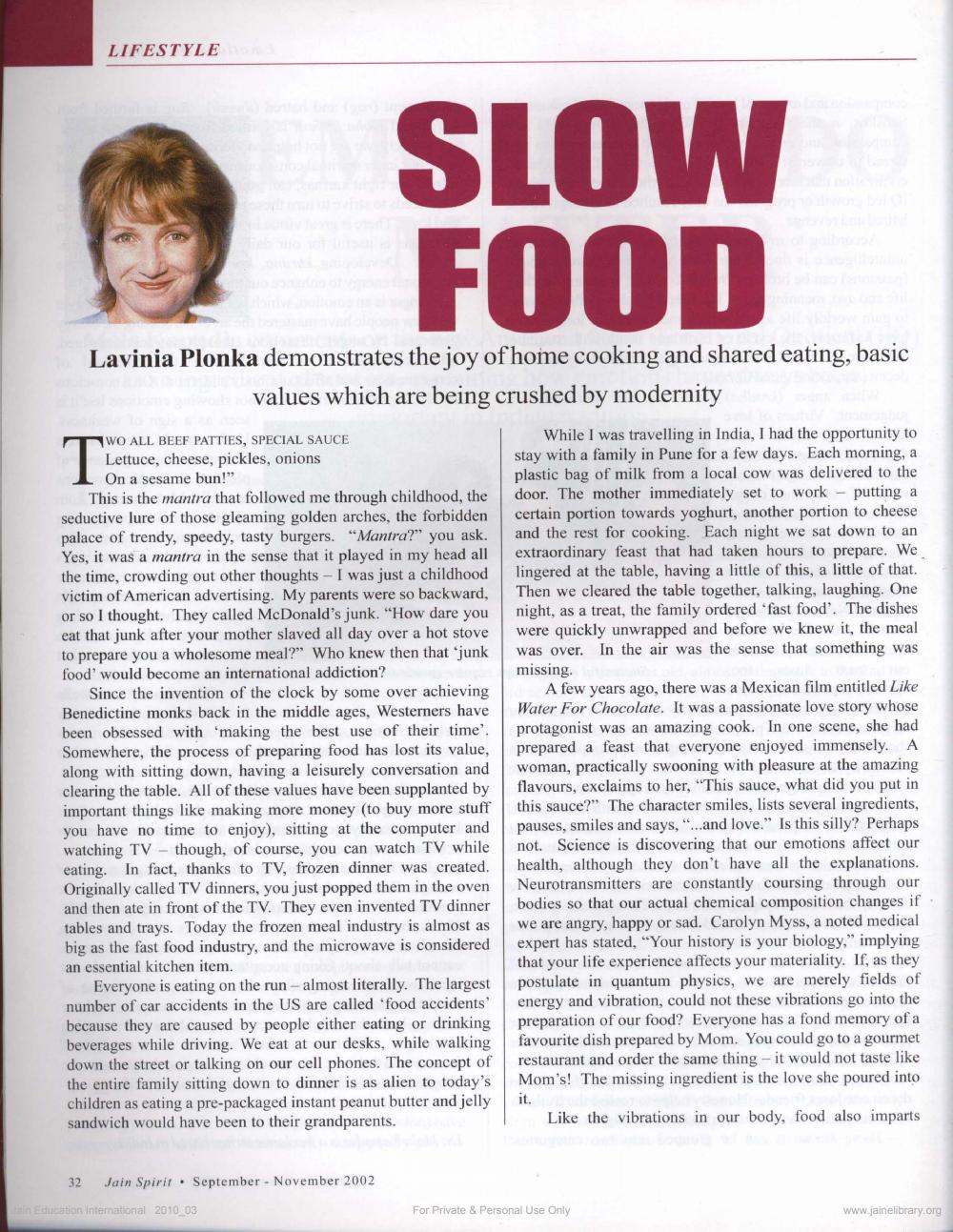________________
LIFESTYLE
SLOW FOOD
Lavinia Plonka demonstrates the joy of home cooking and shared eating, basic
sulle values which are being crushed by modernity
WO ALL BEEF PATTIES, SPECIAL SAUCE
Lettuce, cheese, pickles, onions 1 On a sesame bun!”
This is the mantra that followed me through childhood, the seductive lure of those gleaming golden arches, the forbidden palace of trendy, speedy, tasty burgers. "Mantra?" you ask. Yes, it was a mantra in the sense that it played in my head all the time, crowding out other thoughts - I was just a childhood victim of American advertising. My parents were so backward, or so I thought. They called McDonald's junk. "How dare you eat that junk after your mother slaved all day over a hot stove to prepare you a wholesome meal?" Who knew then that "junk food' would become an international addiction?
Since the invention of the clock by some over achieving Benedictine monks back in the middle ages, Westerners have been obsessed with 'making the best use of their time' Somewhere, the process of preparing food has lost its value, along with sitting down, having a leisurely conversation and clearing the table. All of these values have been supplanted by important things like making more money (to buy more stuff you have no time to enjoy), sitting at the computer and watching TV - though, of course, you can watch TV while eating. In fact, thanks to TV, frozen dinner was created. Originally called TV dinners, you just popped them in the oven and then ate in front of the TV. They even invented TV dinner tables and trays. Today the frozen meal industry is almost as big as the fast food industry, and the microwave is considered an essential kitchen item.
Everyone is eating on the run-almost literally. The largest number of car accidents in the US are called 'food accidents because they are caused by people either eating or drinking beverages while driving. We eat at our desks, while walking down the street or talking on our cell phones. The concept of the entire family sitting down to dinner is as alien to today's children as eating a pre-packaged instant peanut butter and jelly sandwich would have been to their grandparents.
While I was travelling in India, I had the opportunity to stay with a family in Pune for a few days. Each morning, a plastic bag of milk from a local cow was delivered to the door. The mother immediately set to work - putting a certain portion towards yoghurt, another portion to cheese and the rest for cooking. Each night we sat down to an extraordinary feast that had taken hours to prepare. We lingered at the table, having a little of this, a little of that. Then we cleared the table together, talking, laughing. One night, as a treat, the family ordered fast food'. The dishes were quickly unwrapped and before we knew it, the meal was over. In the air was the sense that something was missing.
A few years ago, there was a Mexican film entitled Like Water For Chocolate. It was a passionate love story whose protagonist was an amazing cook. In one scene, she had prepared a feast that everyone enjoyed immensely. A woman, practically swooning with pleasure at the amazing flavours, exclaims to her, "This sauce, what did you put in this sauce?" The character smiles, lists several ingredients, pauses, smiles and says, "...and love." Is this silly? Perhaps not. Science is discovering that our emotions affect our health, although they don't have all the explanations. Neurotransmitters are constantly coursing through our bodies so that our actual chemical composition changes if we are angry, happy or sad. Carolyn Myss, a noted medical expert has stated, "Your history is your biology," implying that your life experience affects your materiality. If, as they postulate in quantum physics, we are merely fields of energy and vibration, could not these vibrations go into the preparation of our food? Everyone has a fond memory of a favourite dish prepared by Mom. You could go to a gourmet restaurant and order the same thing - it would not taste like Mom's! The missing ingredient is the love she poured into it.
Like the vibrations in our body, food also imparts
32 Jain Spirit . September - November 2002 in Education International 2010_03
For Private & Personal Use Only
www.jainelibrary.org




